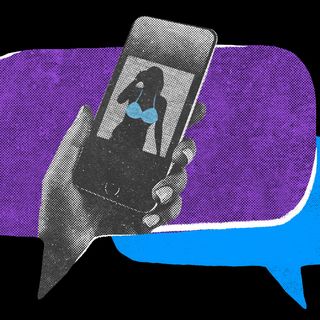
Is This Normal? “I Adopt the Accents of People I Spend Time With”
Code-switching stems from the human instinct to ‘fit in’ better with our immediate company, and feel more ‘in tune’ with them

In this series, we dig into our strange phobias, fixations, and neuroses, and ask ourselves — Is This Normal?
Last week, I suddenly realized I was talking like Kareena Kapoor Khan. Since then I’ve dropped the manner of speaking, but for a brief moment there, I sounded just like her. I’m not surprised this happened, though: I knew was because I had watched one too many of her interviews recently.
Whenever I focus on a person — either because of interacting with them constantly or being over-exposed to them — I involuntarily start mirroring their speech patterns, inflections, gestures, and accents. It requires conscious, steady effort to stop mirroring them. But the adopted way of speaking does fade on its own once sufficient time has passed.
Is this normal, to keep falling into this cycle of making someone else’s mannerisms and tones my own?
My behavior is far more common than I realized. It might be a manifestation of “code-switching” — the act of alternating between dialects, accents, and behaviors. Code-switching is neither shame nor pretense; it’s a survival strategy, as Aditi Murti had written in The Swaddle earlier.
“Code-switching is shifting or manipulating one’s behaviors to appeal to a different crowd or audience… It could refer to other cultural expressions as well — [like] style of dress[ing], physical mannerisms, and other forms of self-presentation,” explains Beverly Tatum, a psychologist and race relations expert. Accents are a form of presentation too.
Related on The Swaddle:
Why Some People Over‑Apologize, And Others Never Do
We code-switch to feel more empathetic to the people we’re interacting with, as past research suggests. And empathy can foster emotional connection — further fulfilling our desire for belongingness.
As Tatum added: “[Code switching] is about finding effective ways to communicate with another person. If someone speaks to another person in a language the other person understands or in a style that puts that person at ease, the likelihood of making a connection with that person increases.” When I pick a friend’s accent, it comes from a sense of kinship. People pleasing is also a very common human instinct; code-switching just happens to be one of its many manifestations.
Naturally, then, the phenomenon is called the “chameleon effect” — or, more formally, “unintentional mirroring.” People do it — albeit subconsciously — to seem less threatening and more likable to their company. Imitation is, after all, the best form of flattery, right? “I am a supreme subconscious accent mimic. I once sent my Australian brother into fits by answering a phone call with a British mate and immediately, unconsciously slipping into cut-glass crisp-vowel English,” J.R. Thorpe, a journalist, wrote in Bustle.
Code-switching also stems from the human instinct to “fit in” better with our immediate company, and feel more “in tune” with them — especially so, when the person who is code-switching belongs to a marginalized group. “When a person from a stigmatized group is interacting with people in a non-stigmatized group, they may code-switch to play down their group membership in order to fit in and be accepted… That might help them advance in their career or feel included at school,” Tatum explains.
As an autistic person, I’ve been subconsciously masking my autistic traits — to avoid being pitied, patronized, babied, ostracized, hated on, harassed, or bullied for being different. I was doing this even before I knew I was autistic or had any idea what “masking” meant. Code-switching, then, became the easiest way for me to mask so I could blend in. It is, in fact, one of the many facets of autistic masking.
Related on The Swaddle:
Why We Expect People With Invisible Disabilities To Learn To Act ‘Normal’
Code-switching, then, becomes a vehicle for protecting oneself. We don’t just code-switch to appear pleasant and empathize with others; it can be a “fawn response,” too — a trauma response that refers to unconscious behavior one indulges in to please others, often in a bid to neutralize any threat that they may pose. “I mirror other people’s mannerisms,” noted an individual living with complex post-traumatic disorder, or C-PTSD, adding, “It’s so scary, actually. I seemingly can’t help (for the moment). I change my voice, facial expressions…”
While code-switching is innately human, it’s not without risks. When one is forced to do it as a survival instinct — maybe because one doesn’t fit in, or because it is driven by a trauma-spawned need to shield oneself constantly — code-switching can become a stressor.
Not only that, but If one begins to lose one’s sense of self in the process of blending, that can be harmful to their mental health too. “Trying to find common ground with others is not harmful by itself. It becomes harmful if you have to deny your own sense of identity in order to do so,” Tatum notes.
The message seems to be clear: it is okay to code-switch, but not at the cost of harming yourself, if you can avoid that. This is a tricky ask, though. Years of masking has distorted my sense of identity, and Istill can’t seem to stop doing it. So, whether the implementation of the message will be nearly as easy, perhaps, only time can tell.
Devrupa Rakshit is an Associate Editor at The Swaddle. She is a lawyer by education, a poet by accident, a painter by shaukh, and autistic by birth. You can find her on Instagram @devruparakshit.
Related


Serena Williams Is Quitting Tennis. It Speaks to Why Fan Cultures Must Allow Athletes to Evolve.
